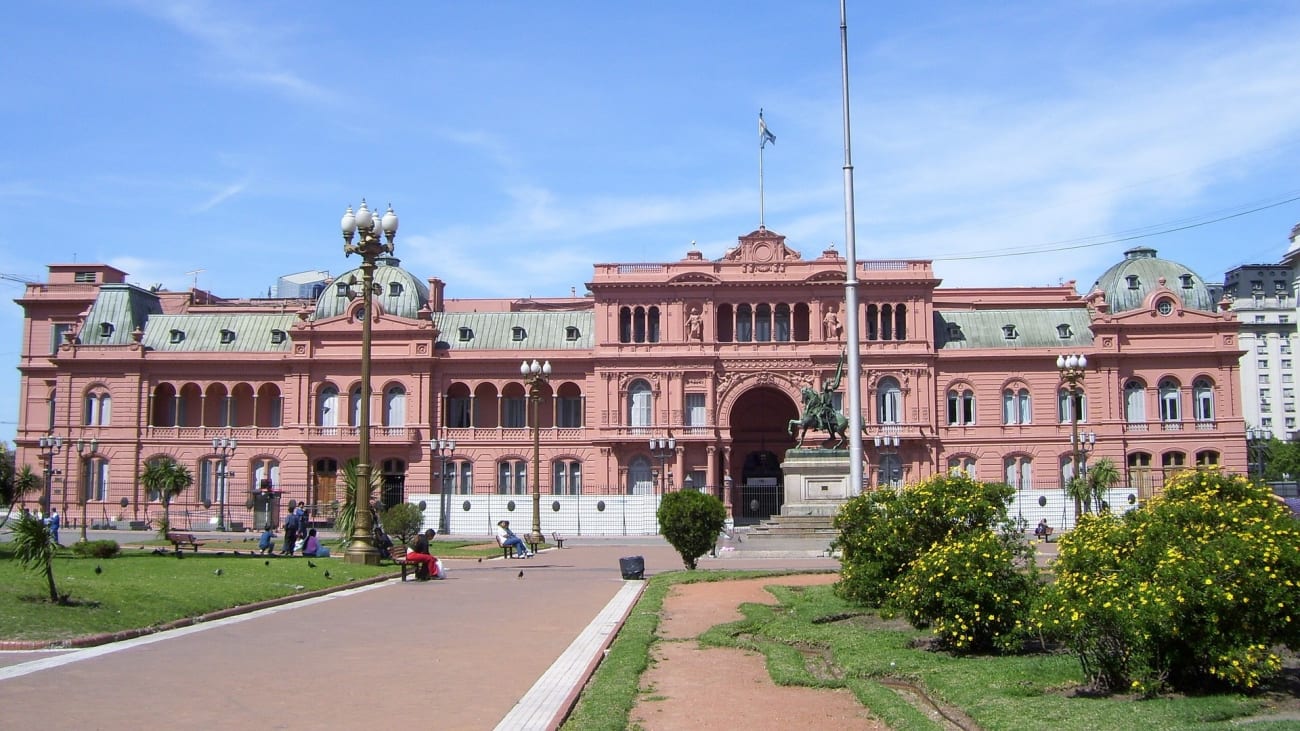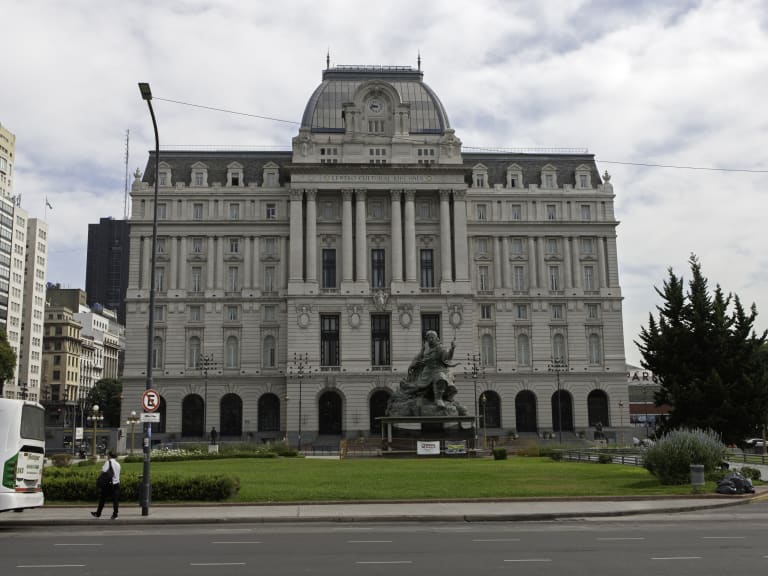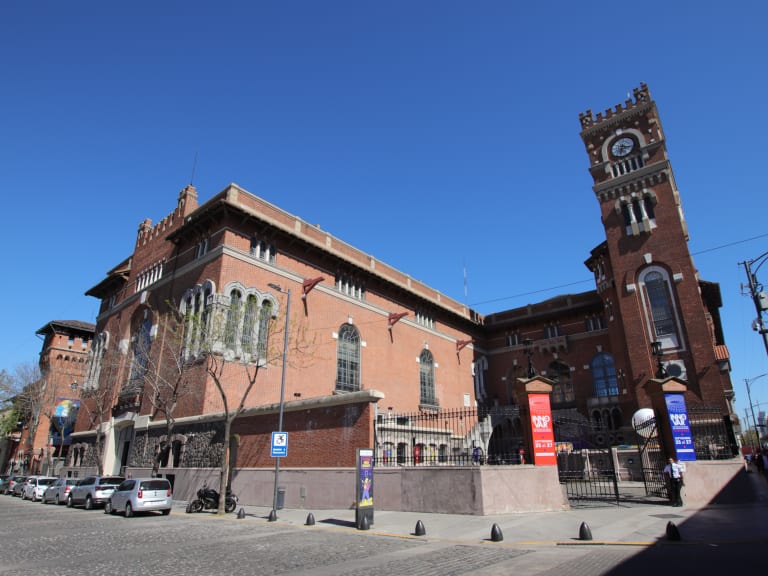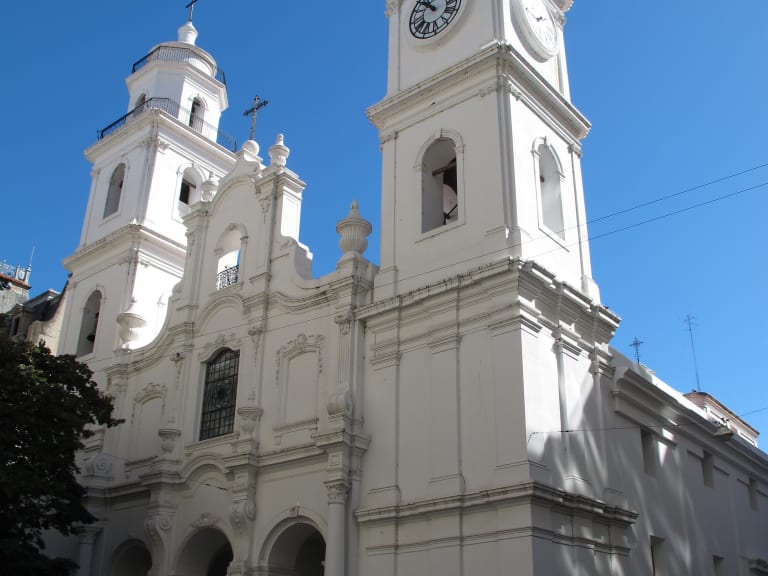10 Best Buildings in Buenos Aires
The buildings of Buenos Aires are not just man-made constructions, but places that keep a great part of the history and culture of this city. Come and visit them and learn from them!

Casa Rosada in Argentina | ©Julianza
The Autonomous City of Buenos Aires is a place full of culture, history and art. If you spend a day in the Argentine capital, you won 't have time to get bored with all the things you can do. Visiting its most outstanding buildings is in fact one of the best things to do in Buenos Aires.
Not only will you be able to admire the architecture of these buildings, but also the historical value of each one. Some were the meeting place of poets, writers and artists of a time, while others represented a breakthrough in the modernity of the city. Discover each of them by visiting this beautiful city.
1. Gran Café Tortoni

The Gran Café Tortoni is the oldest bar in Buenos Aires and one of the most iconic buildings in the city. It is located at 825 Avenida de Mayo. This French-style place also became famous for being the meeting place of the most renowned Literary Peña in Buenos Aires, led by the painter Benito Quinquela Martín.
This bar should definitely be on all your itineraries. It was inaugurated in 1858 and to this day it continues to be a place of cultural and touristic diffusion. It is also part of the group of notable bars in the city. It is also supported by the different programmes promoted by the Government of the City of Buenos Aires.
When you visit El Gran Café I recommend you to pay attention to the table located on the right side, right next to the window near the entrance of Rivadavia. It is said that this table was frequented by the singer Carlos Gardel. You can also visit the room called "La Bodega", to listen to artists playing jazz and tango.
Other spaces worth visiting are the library and the rooms to play dominoes, dice or billiards. Make the most of your visit to eat some of the delicious dishes on the menu, a good coffee or any of the delicious drinks. A visit to this building is important to include in one of the best gastronomic tours in Buenos Aires.
Interesting details
- Price: entrance is free, but you must pay for what you consume.
- Location: Av. de Mayo 825, C1084 Ciudad Autónoma de Buenos Aires, Argentina.
- Hours: from 8:00 am to 9:00 pm.
2. Colón Theatre

The Colon Theatre is one of the buildings you must visit when you travel to Buenos Aires. It is an iconic place that gave its first performance in May 1908: an opera Aida by Giuseppe Verdi. Undoubtedly an iconic performance that would mark the future of this theatre.
For about 20 years, this building was under construction and more than a thousand people were involved in it. According to several conductors who have performed at the Teatro Colón, it is one of the best of its kind. This is because its horseshoe-shaped hall distributes the sound very well and the box floors absorb the sound, as they have soft materials.
Taking a guided tour of the Teatro Colón is one of the best ways to enjoy its facilities. You will be able to learn about all the curious and historical facts hidden in this icon of the city. You will pass through the hall, the gallery of busts, the main foyer and the golden hall.
On the other hand, you can buy tickets to enjoy some of the performances presented during your visit. You can choose from ballet performances, orchestral concerts and operas, among others.
Details of interest
- Price: around 20 €.
- Location: Cerrito 628, Autonomous City of Buenos Aires, Argentina.
- Opening hours: Monday to Friday from 10:00 am to 4:45 pm. Saturdays, Sundays and holidays from 11:00 am to 4:45 pm.
3. Kirchner Cultural Centre

The Kirchner Cultural Centre is dedicated to art exhibitions and musical performances. This centre is located in the building that once housed the city's Post and Telecommunications Palace. You can go to enjoy free activities, see exhibitions without booking in advance and without buying tickets.
At the Kirchner Cultural Centre you can also take guided tours, but these do require prior booking and last an average of 45 minutes. The meeting point for these activities is the central hall. In any case, I recommend that you check the centre' s activities and programme before you go.
An important fact you should know about this building is that it was built in 1890 as part of a project by Norbert Maillart. Also, since 2005 it has been declared a National Historic Monument and Heritage Site after reopening its doors following a lengthy refurbishment.
As well as enjoying the activities on offer at the centre, you can appreciate the architecture of the building. You will notice that it is a diverse and modern space. Among its most attractive and representative rooms are the "Blue Whale" music room, the Chamber Music Room and the Great Chandelier. Meanwhile, the faceted glass dome and its LED lighting system steal all the attention from the outside.
Interesting details
- Price: admission is free, but some activities require reservations.
- Location: Sarmiento 151, C1041 Ciudad Autónoma de Buenos Aires, Argentina.
- Hours: Thursday to Sunday and holidays, from 2:30 pm to 4:00 pm.
4. Barolo Palace

The Barolo Palace is a building built for the businessman Luigi Barolo, by Mario Palanti, an Italian architect. Since its inauguration in 1923, it was the tallest building in Latin America, until 1935, when the Kavanagh was built.
The building has a general division inspired by the Divine Comedy: hell, purgatory and heaven. Other references to this great literary work are the nine access vaults symbolising the nine steps of initiation and the nine infernal hierarchies. The nine angelic choirs are represented by the palace's lighthouse.
If you would like to discover all the references hidden in this building, you can book a guided tour. These activities are available every day of the week except Tuesdays.
Interesting details
- Price: guided tours cost an average of 30 €.
- Location: Av. de Mayo 1370, C1085 Ciudad Autónoma de Buenos Aires, Argentina.
- Opening hours: from 10:00 am to 10:00 pm.
5. Paz Palace

The Palacio Paz, or Palacio Retiro, is a National Historic-Artistic Monument since 2014. This was the largest and most luxurious residence in the city at the beginning of the 20th century. It was originally owned by the politician and journalist José C. Paz. Its presence is imposing and its Beaux-Arts architectural style stands out.
Over the years the building became state property and was transformed into the headquarters of the Military Circle, the National Military Library and the National Arms Museum. In spite of changing its function, the Palacio Paz still preserves secrets and mysteries, as well as admirable works of art that you cannot miss.
A good idea to get to know this place is to take a guided tour. You can ask a local guide to make a stop here as part of a tour of Buenos Aires. This way you will be able to see the original sculptures of the palace or the paintings of the Círculo Militar.
Interesting details
- Price: guided tours can cost an average of 100 €.
- Location: Av. Sta. Fe 760, C1059 Ciudad Autónoma de Buenos Aires, Argentina.
- Timetable: Visiting hours may vary according to the availability of the Military Circle and the guide.
6. Usina del Arte

The Usina del Arte is a cultural centre where various artistic events such as workshops, recitals, theatrical plays, among others, are presented. It constantly has an attractive cultural programme for the whole family, from the youngest to the oldest.
This building, like others on this list, is important for the Argentine capital because of its historical value. The Usina del Arte was inaugurated in 1916 and was considered a "palace of light", as it was the headquarters of the Ítalo Argentina de Electricidad.
It recently underwent a renovation process that turned it into the current space focused on culture and artistic expressions. After some time the building was abandoned, until the National Government in 2000 began the task of recovering the site. After many years of work, the building adopted the name of Usina del Arte and houses the headquarters of the National Symphony and Philharmonic Orchestras of Buenos Aires.
If you wish to see the facilities of this building, you can enjoy a free guided tour. These last an average of 45 minutes and can be taken on Saturdays, Sundays and public holidays from two to five in the afternoon. Events are also free of charge, although some of them require booking.
Interesting details
- Price: free guided tours.
- Location: Agustín R. Caffarena 1, C1157 Ciudad Autónoma de Buenos Aires, Argentina.
- Hours: Fridays from 3pm to 8pm. Saturdays, Sundays and holidays, from 11 am to 8 pm. Exploratory visits take place at 5 pm.
7. Kavanagh Building

The Kavanagh Building is known as the first skyscraper in Latin America. At the time it was also the first to have air conditioning, considered a luxury at the time. In 1999 it was declared a National Historic Monument and, by decision of UNESCO, it also became part of the World Heritage of Modern Architecture.
This building is 120 metres high and, for years, was the tallest in the city and in all of Latin America. Its staggered form makes it stand out from other buildings, as well as allowing the creation of terraces with gardens. It has 105 flats and laundry workshops, among other services.
Unlike other buildings in the city, the Kavanagh Building does not allow guided tours for tourists. Only residents can enter, so you will have to settle for seeing it on a tour or a bus tour of Buenos Aires.
Interesting details
- Location: Florida 1065, C1005 Ciudad Autónoma de Buenos Aires, Argentina.
Traveller Tip
When you are doing a city tour, make sure to include some activity near this building. This way you can pass by and see it from the outside, making the most of your time in Buenos Aires.
8. Church of San Ignacio de Loyola

The Church of San Ignacio de Loyola was declared a National Historic Monument in May 1942 and is the oldest religious building in the Autonomous City of Buenos Aires. It is located in the neighbourhood of Montserrat and was inaugurated in 1722, although it was finished in 1734.
When you visit this church, you should take a look at its dome on a quadrangular drum without ornamentation. You can also appreciate its façade, which is influenced by Bavarian Baroque. Inside the church you will be able to see the main altar dating from the 17th century. It was carved in wood and later painted gilded.
If you are interested in exploring more of its interior, I invite you to take a guided tour whose average cost is approximately four euros for adults and three for children under the age of 12. Visiting days are Tuesdays, Thursdays and Saturdays. Please note that you must book this experience in advance.
Interesting details
- Price: around 4 € for adults and 3 € for children.
- Location: Bolívar 225, C1091 Ciudad Autónoma de Buenos Aires, Argentina.
- Opening hours: guided tours take place on Tuesdays at 4pm, Thursdays from 11:30am to 4pm and Saturdays from 2pm to 4pm.
9. Güemes Gallery

The Güemes Gallery or Güemes Passage is an emblematic building built in Art Nouveau style. It stands out for having an interior pedestrian passageway that joins Florida and San Martín streets.
This passageway is 116 metres long and has 24 shops and 300 offices, among other places. But the most striking feature of this building is its viewpoint, which was opened for visits in April 2010. From there you can get a 360-degree view of the city.
This building was the first to be built entirely of reinforced concrete in Buenos Aires. It was inaugurated in December 1915 and, like many other buildings in the city, it was abandoned for a long time. Its restoration was completed in 2008, when the Astor Piazzolla complex was installed.
Interesting details
- Price: free guided tours.
- Location: Florida 165, San Martín 170, 1005 Ciudad Autónoma de Buenos Aires, Argentina.
- Hours: Tuesdays at 16:00 h.
10. Russian Orthodox Church of the Holy Trinity

The Russian Orthodox Church of the Holy Trinity is a peculiar building that stands out for its striking style. It seems to be taken out of context because of its location and its domes, which are not at all similar to the general architecture of Buenos Aires. Since its construction in 1901, it has been used as a centre of worship and meetings for orthodox Christianity.
To see the inside of the church, you can go on the days of religious services. This way you can witness the choir, the faithful, the clergy and other participants in the ceremony. Please note that you will not be allowed to walk around the site or ask questions. It is also forbidden to take photographs or film while the religious ceremony is taking place.
Although it has its limitations, this can be a good way to get to know a culture different from the Argentinean culture without going to another country. Please note that the timetable for religious services is Saturdays from 5pm to 8pm. You can also attend on Sundays from 10 a.m. to 12 p.m.
If you prefer, you can take part in a guided tour. These normally take place on the second Sunday of each month at half past three in the afternoon. They last approximately one hour and cost an average of two euros. Please note that you will not be able to take photographs or videos. You will only be able to do so if your host allows you to.
Interesting details
- Price: around 2 €.
- Location: Av. Brasil 315, C1154 Ciudad Autónoma de Buenos Aires, Argentina.
- Opening hours: The religious services are on Saturdays from 5pm to 8pm. You can also attend on Sundays from 10:00 am to 12:00 pm. Guided tours only take place on the second Sunday of each month at 15:30 h.
